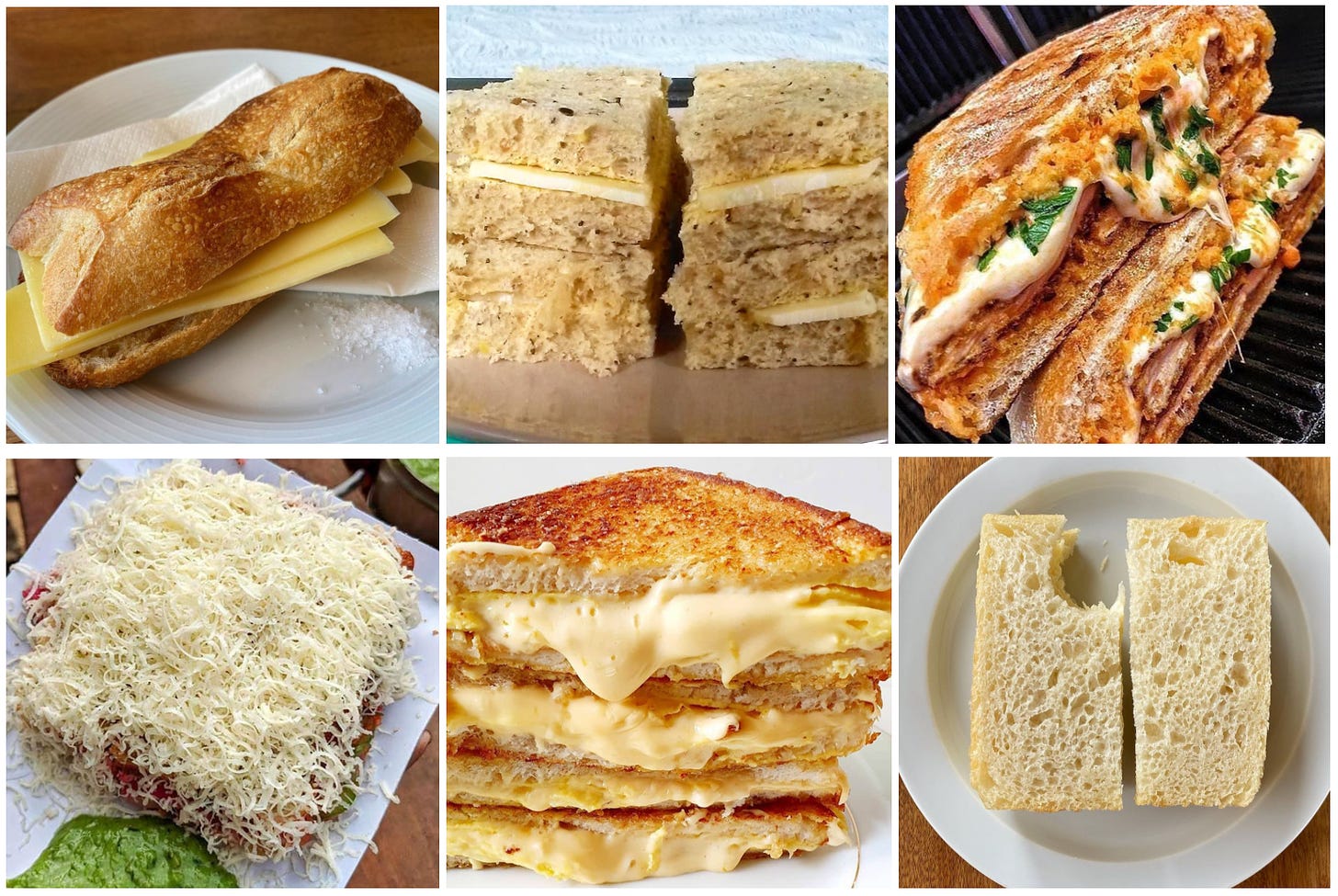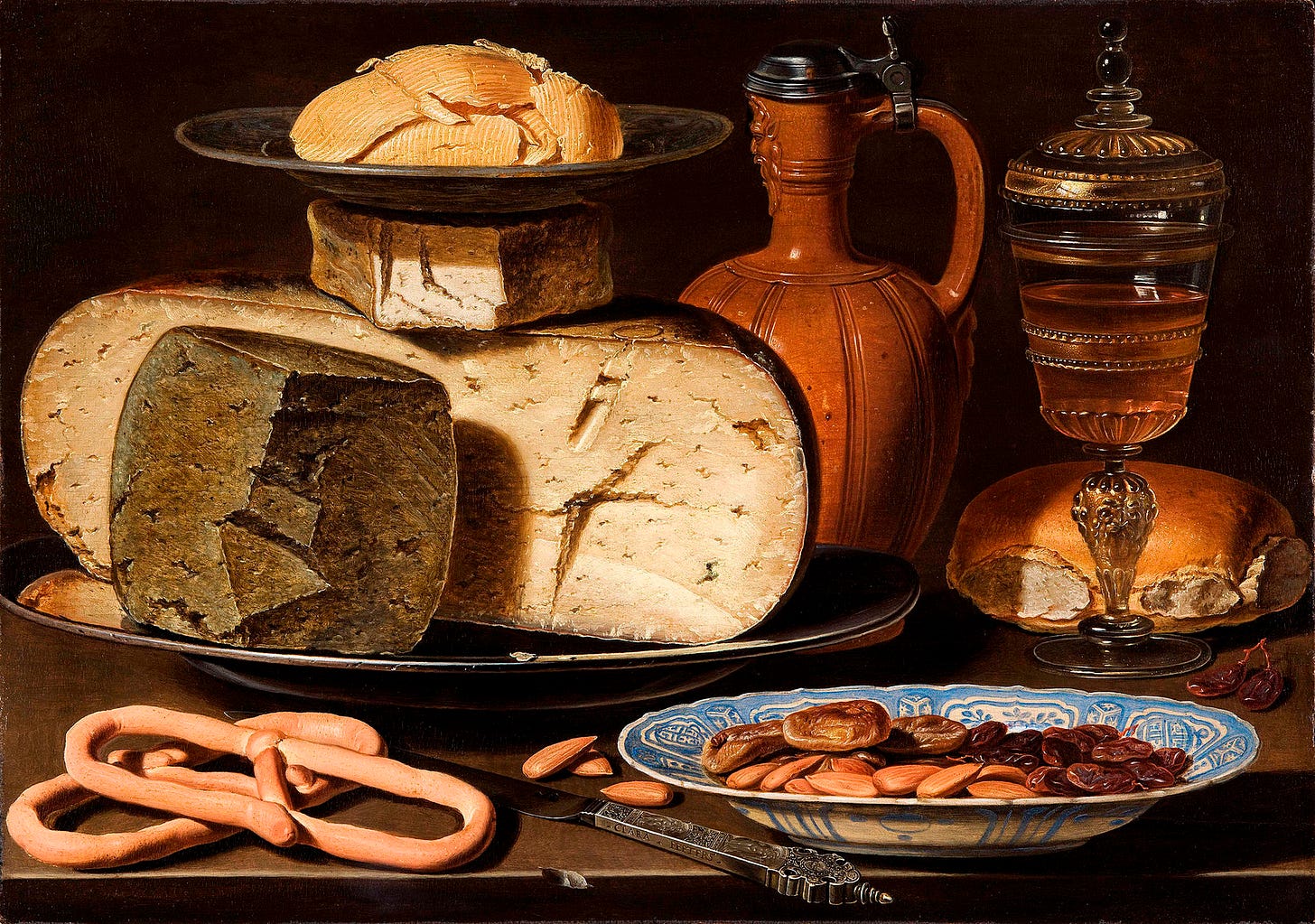Notable Sandwiches #30: Cheese
How could the beings that invented cheese be truly irredeemable?
Welcome back to Notable Sandwiches, the series in which I, alongside my editor David Swanson, trip merrily through the profoundly odd and ever-changing document that is Wikipedia’s List of Notable Sandwiches. This week: what if bread… also had cheese on it?

This week’s sandwich is pretty much what it says on the tin: it’s bread and cheese. Grilled cheese has its own separate entry; so does cheese-and-pickle, and the open-faced cheese melt known as the Cheese Dream (Welsh Rarebit, perplexingly, is absent from the list.) As Wikipedia notes, “When a meat sandwich is prepared, the cheese becomes the accompaniment, and the sandwich is known by other names such as ham sandwich, tuna sandwich, etc.” So what remains to us is a consideration of the confluence of two old and multivalent elements: cheese, and bread. (Incidentally, I assume I am going to write the word “cheese” an inordinate number of times in this column, and failing to find any good synonyms, I have chosen to accept it, and to let the word roll around in my mouth like a squeaky little curd as I think of cheese and all it means.)
As I set out to write this column, my editor David, with whom I regularly exchange bizarre and singular text messages, asked me for my “desert island cheese list.” After assuring him that if dropped on a deserted isle with no other company than myself I would promptly die of despair, I set to thinking about it—not so much the Robinson Crusoe/Castaway fantasy of conquering both the elements and my ego, let alone creating a thriving and exotic dairy in the wild, but about what cheeses I’d love to try, and the astonishing array of varieties that grace our expansive cheese plate of a world. I thought about the cheese I’d eat in utter isolation, and then I thought about cheese in the context of the broader world...
And I thought about it, and thought about it, and thought so hard I made myself dizzy.
In this world, there’s donkey-milk cheese, which costs roughly $600 a pound; llama-milk cheese, which is apparently quite fatty and unctuous; Milbenkäse, the local delicacy of Würchwitz, Germany, ripened by the mites that feast on its seasoned rind, and are consumed alongside it; cheese from camels and horses and moose; cheese adorned with lichen. When I think about it, cheese makes for a particularly apt summation of human endeavor: part of our vast and often ill-used dominion over the beasts of the earth, whom we subdue and whose milk we take, and then allow, with care and industry, to rot until it pleases us, and no further. There is so much arrogance and so much care, so much innovation, so much cruel control, that contemplating it takes my breath away—and reminds me that I am part of this strange ambitious species that conjures unlikely beauty even as we savage the earth and each other. It’s heady to consider, and easy to reason yourself into awe when you start with cheese: press a nail into the dense fattiness of a block of cheddar and you pierce human history.
And then you eat it.
The Sword and the Sandwich is a newsletter about serious extremism and equally serious sandwiches. Please consider supporting this work with a paid subscription:
Thinking that hard about cheese gave me a strange feeling that I rarely have these days, ones preoccupied with bad chaotic news and tinged with despair. There’s an old trope of writing that there are four types of conflict—man versus man, man versus nature, man versus self, man versus society. It’s a strange sensation to gaze into the fridge and realize that in one foodstuff is an exemplar of all these elements working in harmony. People make cheese with other people. We use bacteria and the breakdown of proteins to harness nature’s forces to our will. Cheesemongers are not necessarily known for self-torment, but in societies around the world cheese is passed from hand to hand and hand to mouth: Blue Stilton and Red Leicester, Parmesan and Asiago, paneer and feta and labne, Roquefort, halloumi, cotija, kesong puti and akkawi, Tulum and the magnificent suluguni of Georgia, surely a desert-island cheese for the ages. Some cheese is smoked or salted to enhance its preservation and flavor; others, like burrata, are a celebration of lactic freshness, best enjoyed trembling and raw.
In forests and deserts and rainy plains and urban megalopolises milk sleeps in vats until it curdles and becomes cheese. It’s all been so since the first animals were domesticated, over 10,000 years ago, and their milk was stored in the stomachs of various ruminants until it achieved that unique solidity that renders cheese a way to preserve the precious protein. For millennia, it sustained farmers through winter and the harsh early days of spring. It abides with us now. There’s a magnificence to that, to my mind—a continuity so ancient it feels as part of our blood as hemoglobin. Cheese started as a means of survival; it endures as testament to the irrepressible creative force of man. For as often as we betray ourselves, as often as we inflict unthinking cruelty on each other, we make wonders.
If I sound sentimental and trite, I guess that’s a natural disposition of mine—a strange person whose meditations on the nature of food can bring her to the brink of tears. But I can’t stop thinking about the ways in which cheese spans so many realms: nature and domestication; the strange workings of microbes; commerce on the scale of subsistence and of industry; the past and the present; and the ways in which, in the future, we as a species may have to retreat from our present rapacity, and adapt anew. I can’t stop thinking about how often I have despaired for humanity, and yet I love it so much I cannot stop mourning its injustice. My anger is intertwined with an earnest desire for a better world, and a wavering but extant faith that one is achievable. How could the beings that invented cheese—in such a welter of wondrous variety, in such a preponderance of flavor, across such a swathe of geography—be truly irredeemable?
In every wheel of cheese there is a signal not to give up on people; even the casual way we overlook the wonder of it and stuff it into a sandwich (adding bread, about which I could easily write an even more adoring diatribe: its ancient origins, its wild profusion, its inherent brilliance) is a marvel. It’s the boon and curse of life never to be able to savor the wonder of what we create for long; we are a restless species, ever-ready to confront threats, or delve too greedily, or make war instead of pausing to feel true pleasure in all that we’ve already done and are.
I feel lucky that writing about cheese made me able to think about all that’s good, for a moment, before I return to perennial fretfulness. In every wheel of cheese there is a whole dazzling world to consider, ripening under the rind, and ready to be savored.






